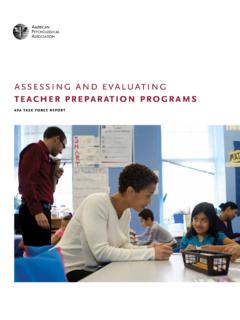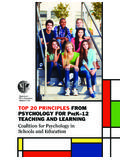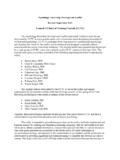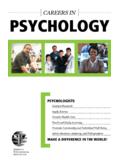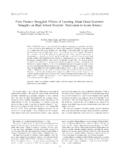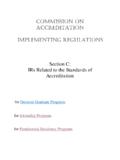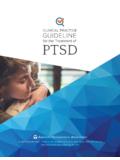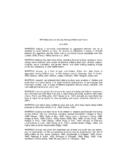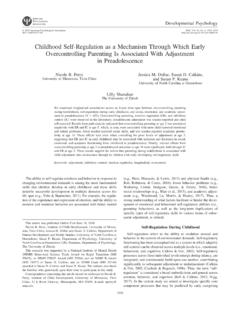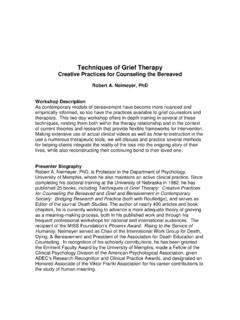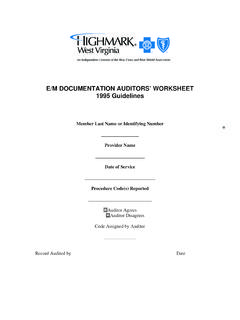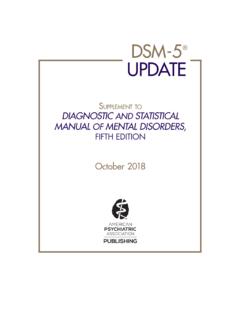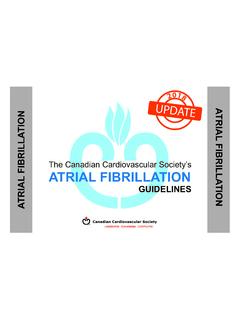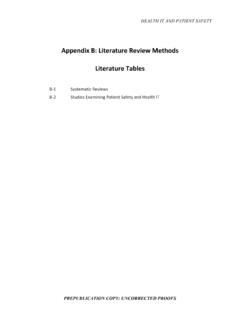Transcription of APA Guidelines for the Evaluation of Dementia and Age ...
1 APA Guidelines . for the Evaluation of Dementia and Age-Related Cognitive Change APA TASK FORCE ON THE Evaluation OF Dementia AND AGE-RELATED COGNITIVE CHANGE. APPROVED BY APA COUNCIL OF REPRESENTATIVES. FEBRUARY 2021. APA | Guidelines for the Evaluation of Dementia and Age-Related Cognitive Change I. Copyright 2021 by the American Psychological Association. This material may be reproduced and distributed without permission provided that acknowledgment is given to the American Psychological Association. This material may not be reprinted, translated, or distributed electronically without prior permission in writing from the publisher. For permission, contact APA, Rights and Permissions, 750 First Street, NE, Washington, DC 20002-4242.
2 This document will expire as APA policy in 10 years (2031). Correspondence regarding the Guidelines for the Evaluation of Dementia and Age-Related Cognitive Change should be addressed to the American Psychological Association, 750 First Street, NE, Washington, 20002-4242. Suggested Citation American Psychological Association, APA Task Force for the Evaluation of Dementia and Age-Related Cognitive Change. (2021). Guidelines for the Evaluation of Dementia and Age-Related Cognitive Change. Retrieved from II APA | Guidelines for the Evaluation of Dementia and Age-Related Cognitive Change APA Guidelines . for the Evaluation of Dementia and Age-Related Cognitive Change APA TASK FORCE FOR THE Evaluation OF Dementia AND AGE-RELATED COGNITIVE CHANGE.
3 APPROVED BY APA COUNCIL OF REPRESENTATIVES. FEBRUARY 2021. APA Task Force Benjamin T. Mast, PhD, ABPP (Chair) Mary M. Machulda, PhD, ABPP, LP. University of Louisville Department of Psychiatry and Psychology Mayo Clinic College of Medicine and Science Andreana Benitez, PhD. Medical University of South Carolina Glenn E. Smith, PhD, ABPP. University of Florida Shellie-Anne Levy, PhD. University of Florida Kelsey R. Thomas, PhD. University of California, San Diego and Veterans Affairs San Diego Healthcare System TAB L E O F C O NT ENTS. Introduction 3. The Guidelines 6. General Guidelines : Competence 7. General Guidelines : Ethical Considerations 8. Procedural Guidelines : Conducting Evaluations of Dementia and Age-Related Cognitive Change 12.
4 Conclusion 19. References 29. APA | Guidelines for the Evaluation of Dementia and Age-Related Cognitive Change 1. 2 APA | Guidelines for the Evaluation of Dementia and Age-Related Cognitive Change IN TRO D UCTI ON. Dementia , or major neurocognitive disorder as it is termed in the and may be accompanied by an enforcement mechanism. Diagnostic and Statistical Manual of Mental Disorders (DSM-5 ) Guidelines are aspirational in intent. They are intended to facilitate (American Psychiatric Association, 2013), is a leading cause of cog- the continued systematic development of the profession and to help nitive and functional decline among older adults worldwide and will facilitate a high level of practice by psychologists.
5 Guidelines are not continue to ascend in global health importance as populations con- intended to be mandatory or exhaustive and may not be applicable tinue to age and effective cures remain elusive (Mathers & Loncar, to every professional situation. They are not definitive, and they are 2006). By 2060, million Americans age 65 and older are pro- not intended to take precedence over the judgment of psychologists. jected to be diagnosed with Alzheimer's disease and related demen- Further, professional practice Guidelines are developed based on tias (Matthews, et al, 2019), although the incidence of Dementia may consensus within the field and thus differ from clinical practice be decreasing (Knopman, 2020).
6 The incidence for mild cognitive Guidelines that rely on systematic reviews and strength of evidence impairment (MCI) or mild neurocognitive disorder (DSM-5 ) rules (APA, Professional Practice Guidelines , Guidance for Develop- (American Psychiatric Association, 2013) may be twice as high as ers and Users, 2015b). These Guidelines conform to the Ethical Dementia (Plassman & Potter, 2018). African Americans and Latinx Principles of Psychologists and Code of Conduct (APA, 2017a). The have higher rates of Dementia (Mehta et al., 2017) due in part to Guidelines may not be applicable in certain circumstances, such as historical, sociocultural, and healthcare inequities (Plassman & some experimental or clinical research projects or some forensic Potter, 2018).
7 Evaluations. The Guidelines are developed for use in the United What follows are professional practice Guidelines developed for States but may be appropriate for adaptation in other countries. psychologists who perform evaluations of Dementia , MCI, and Psychologists are uniquely equipped through training, exper- age-related cognitive change. Although the DSM-5 uses the terms tise, and the use of specialized neuropsychological tests to assess mild neurocognitive disorder and major neurocognitive disorder, the changes in cognitive and behavioral functioning and to distinguish broader research and practice literature typically uses the terms typical changes from early signs of neuropathology.
8 Neuropsycho- mild cognitive impairment and Dementia , and this document follows logical Evaluation and cognitive testing remains the most effective that convention. Their goal is to promote proficiency and expertise differential diagnostic methods for discriminating pathophysiologi- in assessing Dementia and age- related cognitive decline in clinical cal Dementia from age-related cognitive decline, cognitive difficul- practice. Although Dementia and MCI occur in individuals under age ties that are depression related, and other related disorders. Although 65, the majority of cases occur in older adults, who are the popula- biomarkers are used broadly in research and in some clinical settings, tion of focus in these Guidelines .
9 Neuropsychological Evaluation and cognitive testing are necessary Additionally, given the stark racial and cultural disparities in to determine the onset of Dementia , the functional expression of the Dementia outcomes (Stokes et al. 2020), multicultural competence disease process, the rate of decline, the functional capacities of the in all aspects of assessment of cognitive decline in older adults is individual, and eventually response to disease-modifying therapies. applicable to all the Guidelines and is their ideal aspiration. That is, while biomarkers can detect the underlying neuropathologic Guidelines are statements that suggest or recommend specific changes, cognitive testing is necessary to determine how the disease professional behavior, endeavors, or conduct for psychologists.
10 Is impacting one's functioning (Block et al., 2017; Weissberger et al.). Guidelines differ from standards in that standards are mandatory APA | Guidelines for the Evaluation of Dementia and Age-Related Cognitive Change 3. Development Process Professional practice Guidelines on this topic were originally devel- oped by an APA Presidential Task Force, approved as policy by the APA Council of Representatives, and published in 1998 (APA. Presidential Task Force on the Assessment of Age-Consistent Memory Decline and Dementia , 1998). The Guidelines were reviewed, updated and renamed the Guidelines for the Evaluation of Dementia and Age-Related Cognitive Change in 2011 (APA, 2012c). In 2019, the Board for the Advancement of Psychology in the Public Interest (BAPPI) and the Committee on Aging (CONA).
